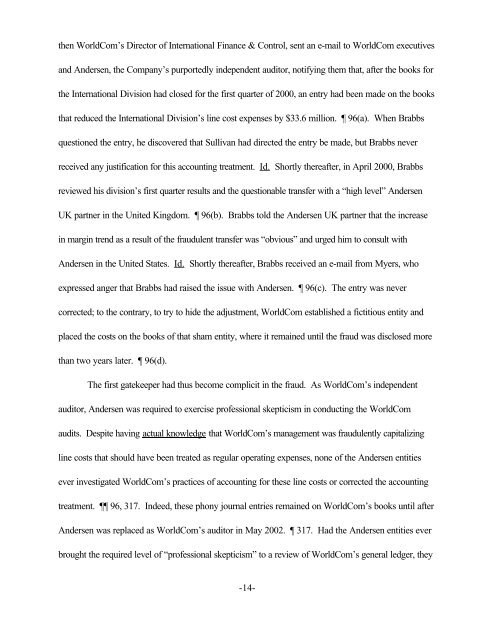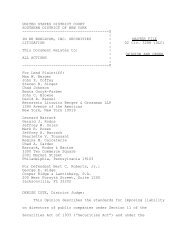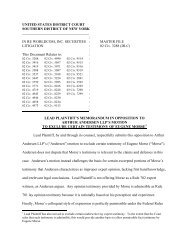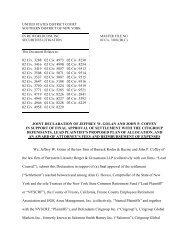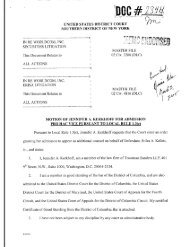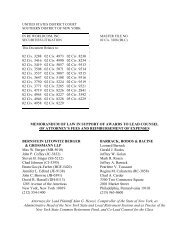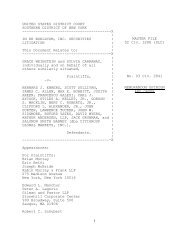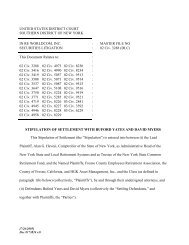Lead Plaintiff's Memorandum of Law in Opposition to Defendants'
Lead Plaintiff's Memorandum of Law in Opposition to Defendants'
Lead Plaintiff's Memorandum of Law in Opposition to Defendants'
Create successful ePaper yourself
Turn your PDF publications into a flip-book with our unique Google optimized e-Paper software.
then WorldCom’s Direc<strong>to</strong>r <strong>of</strong> International F<strong>in</strong>ance & Control, sent an e-mail <strong>to</strong> WorldCom executives<br />
and Andersen, the Company’s purportedly <strong>in</strong>dependent audi<strong>to</strong>r, notify<strong>in</strong>g them that, after the books for<br />
the International Division had closed for the first quarter <strong>of</strong> 2000, an entry had been made on the books<br />
that reduced the International Division’s l<strong>in</strong>e cost expenses by $33.6 million. 96(a). When Brabbs<br />
questioned the entry, he discovered that Sullivan had directed the entry be made, but Brabbs never<br />
received any justification for this account<strong>in</strong>g treatment. Id. Shortly thereafter, <strong>in</strong> April 2000, Brabbs<br />
reviewed his division’s first quarter results and the questionable transfer with a “high level” Andersen<br />
UK partner <strong>in</strong> the United K<strong>in</strong>gdom. 96(b). Brabbs <strong>to</strong>ld the Andersen UK partner that the <strong>in</strong>crease<br />
<strong>in</strong> marg<strong>in</strong> trend as a result <strong>of</strong> the fraudulent transfer was “obvious” and urged him <strong>to</strong> consult with<br />
Andersen <strong>in</strong> the United States. Id. Shortly thereafter, Brabbs received an e-mail from Myers, who<br />
expressed anger that Brabbs had raised the issue with Andersen. 96(c). The entry was never<br />
corrected; <strong>to</strong> the contrary, <strong>to</strong> try <strong>to</strong> hide the adjustment, WorldCom established a fictitious entity and<br />
placed the costs on the books <strong>of</strong> that sham entity, where it rema<strong>in</strong>ed until the fraud was disclosed more<br />
than two years later. 96(d).<br />
The first gatekeeper had thus become complicit <strong>in</strong> the fraud. As WorldCom’s <strong>in</strong>dependent<br />
audi<strong>to</strong>r, Andersen was required <strong>to</strong> exercise pr<strong>of</strong>essional skepticism <strong>in</strong> conduct<strong>in</strong>g the WorldCom<br />
audits. Despite hav<strong>in</strong>g actual knowledge that WorldCom’s management was fraudulently capitaliz<strong>in</strong>g<br />
l<strong>in</strong>e costs that should have been treated as regular operat<strong>in</strong>g expenses, none <strong>of</strong> the Andersen entities<br />
ever <strong>in</strong>vestigated WorldCom’s practices <strong>of</strong> account<strong>in</strong>g for these l<strong>in</strong>e costs or corrected the account<strong>in</strong>g<br />
treatment. 96, 317. Indeed, these phony journal entries rema<strong>in</strong>ed on WorldCom’s books until after<br />
Andersen was replaced as WorldCom’s audi<strong>to</strong>r <strong>in</strong> May 2002. 317. Had the Andersen entities ever<br />
brought the required level <strong>of</strong> “pr<strong>of</strong>essional skepticism” <strong>to</strong> a review <strong>of</strong> WorldCom’s general ledger, they<br />
-14-


